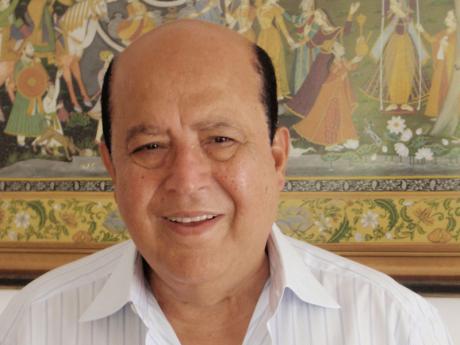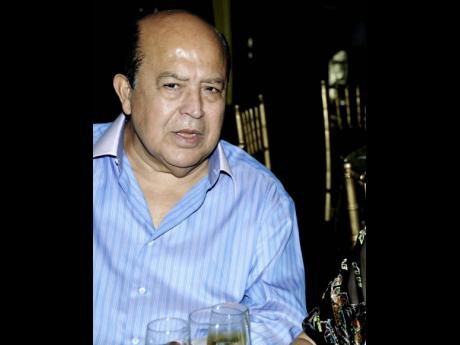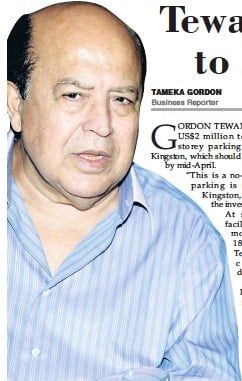
“I asked my uncle: ‘Where is Jamaica?’ He told me: ‘It’s America.’ When I arrived at Palisadoes Airport I saw palm trees. I’d seen pictures in a magazine and thought: ‘America? America don’t look like this! The people, they look African origin.’ I was wondering if I’m in the wrong place.”
By Laura Tanna
We all might learn from the discipline, almost deprivation, which a youthful Gordon Tewani displayed in his quest to better his family, leaving school a year before graduation to seek work in a foreign land. When jewelry store owner and real estate tycoon Tewani got his first job offer to leave India in 1959 to work in Jamaica, he says: “I asked my uncle: ‘Where is Jamaica?’ He told me: ‘It’s America.’ So you wouldn’t believe it, when I arrived at Palisadoes Airport I see palm trees. I’d seen pictures in a magazine and thought: ‘America? America don’t look like this! The people, they look African origin.’ I was wondering if I’m in the wrong place. Honestly, that’s what I thought in my ignorance. In those days, coming from a Commonwealth country an immigration officer would just stamp on your passport: ‘Landed’. There was no work permit required because Jamaica was still under the British. My boss’ son looked at me, said: ‘Are you Gordon? I’m Pokar.’ He drove me to his house on Waterloo Road, opposite Devon House. Today that is [the] Salvation Army. That was Mr. Chandiram’s house. We three employees lived in an annex. I’ll never forget it, because they never had hot water in the bathroom and the bathroom was downstairs. We had to come on the steps, tie a towel around us, run into the bathroom, take cold shower, and run up again. The steps were on the outside of the house!”
 “The name of the business was India House, 60 King Street. They told me this was the main street. I remember observing electrical lines overhead. In Bombay, they are underground so we don’t see them. I said to myself: ‘This is really a small place.’ But a beautiful place. My impression was of really beautiful vegetation and very clean. Mrs. Chandiram, the manager, said: ‘Your job is to go behind the counter. When they make sales, they will give to you to wrap.’ I was a person very keen on learning. If I don’t have anything to wrap, if they are selling something, I would go, stand beside them, see what they’re saying and try to learn. I learned so fast she told me: ‘You can sell now.’ She gave us a little book to write the sales; almost every day I used to be number one in sales. At that time tourists were coming to Kingston because Kingston was a very, very safe place. You could walk on King Street, nobody would trouble you. Everybody was very mannerly. They said: ‘Good morning, good evening, good afternoon, how are you?’ I found Jamaicans among the friendliest people in the world.”
“The name of the business was India House, 60 King Street. They told me this was the main street. I remember observing electrical lines overhead. In Bombay, they are underground so we don’t see them. I said to myself: ‘This is really a small place.’ But a beautiful place. My impression was of really beautiful vegetation and very clean. Mrs. Chandiram, the manager, said: ‘Your job is to go behind the counter. When they make sales, they will give to you to wrap.’ I was a person very keen on learning. If I don’t have anything to wrap, if they are selling something, I would go, stand beside them, see what they’re saying and try to learn. I learned so fast she told me: ‘You can sell now.’ She gave us a little book to write the sales; almost every day I used to be number one in sales. At that time tourists were coming to Kingston because Kingston was a very, very safe place. You could walk on King Street, nobody would trouble you. Everybody was very mannerly. They said: ‘Good morning, good evening, good afternoon, how are you?’ I found Jamaicans among the friendliest people in the world.”
“Mr. Chandiram opened In-Bond because he saw a lot of potential in selling to tourists, mainly perfume and items like cameras. There was quite a thick book of perfume list, the sizes, prices, and different brands. I’m not kidding you. I knew every size, every brand by heart. The other staff, if some customer asked them: ‘Do you have Chanel Number Five, one ounce?’ they would ask me: ‘Mr. Gordon, what is the price for it?’ And I would tell them. My memory was really good. Everything I see someone is doing, I would say: ‘I can do it too.’
“There was no private life allowed. Every morning the driver would drive us to the shop. Every evening we would drive back to the house. He had a strict instruction not to stop anywhere. We’d come from work, have our dinner. They gave us reasonably good food to eat and after that, back to work again, like checking what we sold for the day and goods to price at home, sometimes until ten or 11 o’clock. The only place our boss allowed us to go was to movie on Sunday. He would give us five shillings. The ticket was four shillings. We walked from Waterloo Road to Half-Way Tree and take a JOS bus for three pence. At intermission we’d buy a coke, which cost seven pence. All we were left was two pence. We couldn’t take a bus again, so we walked back from the Regal, Carib or State.
“I got £60 every three months. Two-thirds of my salary I sent to my mother and £20 I’m to keep because boss used to give us everything like soap, hair oil, and shaving. I might have to buy a shirt or a shoe. I had a contract for four years. He is to provide me transport from Mumbai [formerly Bombay] to Kingston and from Kingston to Bombay. I saved £100 over the four years and my boss gave me a bonus of £100. I told him to return to India, we want to go to Canada. He got a ticket that we could go from Miami to New York to Toronto, then from there to Bombay. There was another guy, Rochie, who still lives in Ocho Rios and he was working same time. I remember going to Miami, finding the cheapest hotel there, US$4.50 per night. A Cuban restaurant on the ground floor used to sell a quarter of chicken with French fries and a coke for US 39 cents. I would eat that. When he came we both stayed in the same room, because we had two beds and that way we shared the cost of the room. It cost US$2.25 then. From there we left to New York and to Toronto. We changed the ticket and came back to Kingston. I remember going to Mr. Chandiram’s office, just a courtesy. Mr. Chandiram was away in India but Pokar was there. He was shocked to see me. He says: ‘What are you doing here?’
 “You see, I missed my family very much. When I first came to Jamaica, after three months my father passed away in India. I couldn’t go back because if I went back, I lost my job and jobs were very hard to get. I really missed [him] very much, but I had to establish myself and the opportunity was better in Jamaica than in India. I only saw my mother again after nine years. I was here for five years more before I could make enough money to return to see her.”
“You see, I missed my family very much. When I first came to Jamaica, after three months my father passed away in India. I couldn’t go back because if I went back, I lost my job and jobs were very hard to get. I really missed [him] very much, but I had to establish myself and the opportunity was better in Jamaica than in India. I only saw my mother again after nine years. I was here for five years more before I could make enough money to return to see her.”
Now at age 70, a successful businessman with a happy family, he muses on what life might be like if he arrived in Jamaica today. He says: “To be honest I love politics but I’m very neutral. Either party, I just want the right person. We need good governance, a good leader to govern this country. The people, especially at the lower level, their life should be improved. It’s very important. Government should spend much more money to educate the population. If today our population was more literate, we would have less problems, not crime alone, but all around. It would be easier for people to get jobs. When you have a large section of illiterate population, how many people you can employ as household help? Or gardener? Or something like that? Those jobs are not satisfactory because they are not well-paying jobs. With education and a skill, you can get a better job. Once you don’t have that – because I didn’t have a good education myself. I didn’t have a skill either. I just happened to be street-smart and lucky. Maybe I shouldn’t say lucky, but hard-working, and I succeeded in life. But today, suppose I didn’t have this business? I don’t know what kind of job I could get! Maybe selling behind the counter. How much money that can pay me?” (Continues)
_________________
Courtesy: The Gleaner, Jamaica (Published on February 12, 2012)
Click here for Part-I